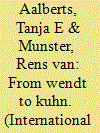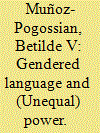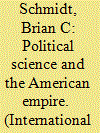| Srl | Item |
| 1 |
ID:
083578


|
|
|
|
|
| Publication |
2008.
|
| Summary/Abstract |
argue that gender mainstreaming across varied policy contexts may help to transform the 'inferior' status allocated to feminist international relations (IR) in relation to mainstream (masculinist) IR. I begin by outlining the problem of this inferior status, explaining the historical background to it and reasons for its perpetuation. I then explain gender mainstreaming developments and diverse ways in which they illustrate the importance of gender, including for our understanding of power and inequality. I pose questions about whether these developments and the policy practices related to them can raise consciousness in the wider IR discipline about the nature of feminist IR, and its contribution as an inclusive approach to humanity, focusing on both men and women and relations among and between them. I argue that gender mainstreaming policies related to the core IR area of human security and violence are a key challenge to the constraints of masculinist IR. I conclude that gender mainstreaming could be a site of new conversations and understanding between feminist IR and mainstream IR
|
|
|
|
|
|
|
|
|
|
|
|
|
|
|
|
| 2 |
ID:
083580


|
|
|
|
|
| Publication |
2008.
|
| Summary/Abstract |
Constructivism is often identified as the legitimate occupant of the middle ground between rationalism and reflectivism that emerged from the Third Debate in international relations (IR) theory. Indeed, the rationalist-constructivist debate is already being framed as the next dominant debate with the IR community. This paper evaluates the bridge-building project as initiated by Alexander Wendt, and takes issue with the via media as proposed by the so-called conventional constructivists. It is claimed that the rationalist-constructivist debate has been limited to a discussion of ontology, which has brought about a contradiction between ontology and epistemology. Returning to the pressing epistemological issues that were put on the table by reflectivist scholars, this article refocuses the current debate by taking up the Kuhnian link between substance and science. It elaborates a view of science as a communal practice built on intersubjective conventions and argumentative procedures. This leads to an alternative conception of the middle ground as a communicative space.
|
|
|
|
|
|
|
|
|
|
|
|
|
|
|
|
| 3 |
ID:
083579


|
|
|
|
|
| Publication |
2008.
|
| Summary/Abstract |
After visiting Latin America in 1950, George F. Kennan presented a report to the Secretary of State Dean Acheson on his impressions of the region and its significance for the United States in the early Cold War period. This framed much of US-Latin American relations in the early Cold War. This article attempts to determine whether a relationship can be established between notions of power attached to feminine and masculine roles in society and the power dynamics determining US-Latin American relations in this period. US-Latin American relations are analyzed from a gender perspective based on the premise that knowledge and language are socially constructed and influence the practice of diplomacy. The initial hypothesis suggests that because language conveys symbolic representations of power, that is, notions of a superior-subordinate relationship, US officials found it useful to use gender analogies and metaphors when discussing US-Latin American relations. Kennan's reports on the region as well as other US officials' documents related to US policy towards Guatemala in this period are analyzed to uncover notions of unequal power.
|
|
|
|
|
|
|
|
|
|
|
|
|
|
|
|
| 4 |
ID:
083576


|
|
|
|
|
| Publication |
2008.
|
| Summary/Abstract |
The traditional understanding of the origins of international relations (IR) is on the ropes. The old vision of a discipline that was born under an idealist star and matured through a first 'Great Debate' is no longer credible. This article offers an alternative understanding: viz. that a scholarly study of IR emerged during the decades prior to World War I, that the emergence represents an international movement, and that it was occasioned by major changes in Great Power economic and political affairs. By posing a few simple questions - who were the first scholarly IR-authors? where and why they write? - this article identifies some of the formative forces that produced the first (now largely lost) generation of IR scholars. It proposes a historically grounded, alternative to our traditional (largely British and mythological) understanding of early IR scholarship
|
|
|
|
|
|
|
|
|
|
|
|
|
|
|
|
| 5 |
ID:
083577


|
|
|
|
|
| Publication |
2008.
|
| Summary/Abstract |
The article reconstructs the early 20th century conversation among American political scientists about colonialism, imperialism, and empire. This account of the early disciplinary history of the sub-field of International Relations challenges the conventional claims that the field was not established until the end of World War I and that the subsequent period was characterized by idealism. The principal focus is on the contributions of Paul S. Reinsch who was a central figure in carving out a discrete discourse about international politics. Reinsch's work is a testimony to vibrant conversation about international politics that was taking place well before the conclusion of the Great War. This conversation focused on the topics of imperialism and colonialism, and formed the nucleus of the Politics section of the American Political Science Association.
|
|
|
|
|
|
|
|
|
|
|
|
|
|
|
|
| 6 |
ID:
083575


|
|
|
|
|
| Publication |
2008.
|
| Summary/Abstract |
Neo-Gramsican theory has become a widely used approach within the discipline of International Relations. Inspired by Robert Cox's insights into the contribution of the Italian socialist Antonio Gramsci to issues such as hegemony, power, class and production, Gramscian theory has become an increasingly popular approach to examining the character of world order among students and scholars alike. However, such theories have often relied too much upon Cox's own development of Gramcian thought, while overlooking other developments from other disciplines of the social sciences. This article overviews the progress of Gramscian theory in International Relations and argues that while certain achievements have been made towards transferring Gramsci's ideas to the global arena, much has tended to slip back towards structural Marxist accounts of class and state. In response, it is argued that a fresh account towards Gramscian theory is required - one that engages far more with approaches developed outside the Coxian dominated field of International Relations
|
|
|
|
|
|
|
|
|
|
|
|
|
|
|
|